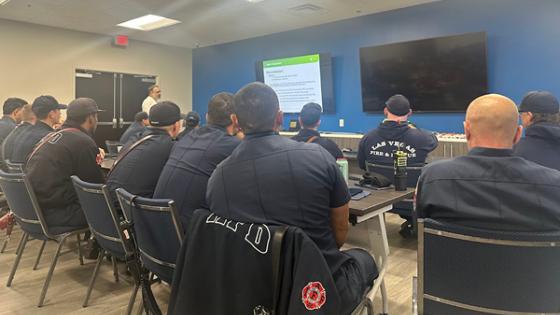
Ethanol Safety & Steel Drum 101 Webinar
This is a virtual event. You will receive additional information after registering.
Available Sessions:
- to CST
- to CST
- to CST
- to CST
- to CST
- to CST
- to CST
- to CST
- to CST
- to CST
Descripción general
Training includes:
- Classroom instruction
- Certificates upon successful completion will be emailed following the event
Nivel de asistente
- Hazmat technician/specialist
- First responders
- Anyone interested in learning more about this topic
- Basic/Introduction
- Intermediate
- Advanced
Enfoque del evento
Featured topics:
- Transportation/Storage practice for steel drums
- Performance standards for steel drums
- Fusible plugs
- Ethanol introduction
- Ethanol and Ethanol-Blended Fuels
- Chemical and Physical Characteristics of Ethanol and Hydrocarbon Fuels
- Transportation and Transfer
- Storage and Dispensing Locations
- Fire Fighting Foam Principles
- General Health and Safety Considerations
- Storage and Pre-planning Considerations
Descripción
Steel Drums 101 Seminar - Provide First Responders with helpful information to better comprehend the components of steel drums. From understanding the difference between an open-head and a
tight-head steel drum to being able to interpret the UN marking. The instructor will dive into the vital safety standards first responders need to know.
Ethanol Safety Seminar - Get an in-depth look at proper training techniques needed when responding to an ethanol - related emergency.
Module 1: Introduction
Module 2: Upon the completion of this module, participants will be able to describe the use and growth of ethanol and ethanol-blended fuels in the United States.
Module 3: Upon the completion of this module, participants will be able to describe the chemical and physical differences between gasoline, ethanol and ethanol-blended fuels.
Module 4: Upon completion of this module, participants will be able to describe how ethanol-blended fuels are transported and transferred as well as where the most likely points for error in these actions will exist.
Module 5: Upon completion of this module, participants will be able to discuss common locations for storage and dispensing of ethanol-blended fuels and will provide a basic understanding of these storage/ dispensing sites.
Module 6: Upon the completion of this module, participants will be able to develop firefighting strategies and foam-use tactics for controlling and fighting fires associated with flammable liquid hazards of ethanol-blended fuels.
Module 7: Upon the completion of this module, participants will be able to determine the potential spill control methods, proper personal protective equipment (PPE), and detection and monitoring devices for responding to ethanol-blended fuel incidents.
Module 8: Upon the completion of this module, participants will be able to develop plans to fight or contain fires at tank farms and bulk storage facilities.
Patrocinadores
- Renewable Fuels Association (RFA)
- Industrial Steel Drum Institute (ISDI)
Event Contacts
Missy
Ruff

In-Person Training Events
Enhance emergency response preparedness with free, expert-led in-person and virtual hazmat training courses.

More Training Options
Choose the training method that works for your team—from online courses and on-site exercises to apps and videos.

Training Resources
Explore additional hazmat resources, including commodity flow studies, AskRail, TRIPR, SERTC, and more.
